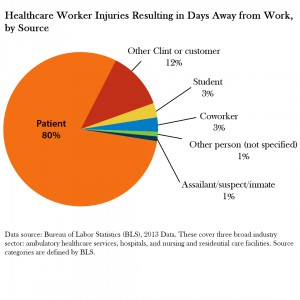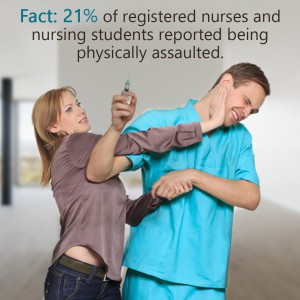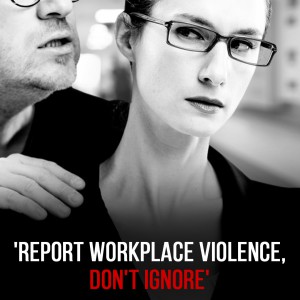Nursing if anything is one of the noblest professions out there. It involves taking care of patient day in day out, consoling concerned family members, working long brutal hours and being there for your patients no matter what. So can the one of the noblest profession also be one of the dangerous ones?
Department of Labor's Bureau of Labor Statistics (BLS) has reported that registered nurses rank among the top five occupations with the most workplace injuries. These injuries range from single occurrence to constant exposure to unhealthy conditions. Long hours and understaffing add to chronic stress and fatigue. Apart from such work inherent stresses, one of the worst occupational hazards faced by nurses today is workplace violence. Workplace violence refers to any act or threat of physical abuse, aggravation, intimidation, or other threatening, disruptive behavior that occurs at the work site. It ranges from threats and verbal abuse to physical assaults and even homicide. The Bureau of Labor Statistics also reported that the most common source of nonfatal injuries and illnesses requiring days away from work in the health care and social assistance industry was abused faced by a health care worker.

According to Journal of Emergency Medicine, Nurses face such ill-treatment and violence from people with mental illness and substance abuse problems, elderly patients with dementia, family members and caregivers who were under extreme stress, patients in a long wait and other escalating factors. They were particularly vulnerable to violence because they are the largest sector of the health care workforce and have to spend time with patients regardless of the conditions they are brought it.
No job not even nursing can justify a threat to violence and be abused as 'part of the job' and something that you have to deal with. Pulling off a ponytail, grabbing, hitting, pushing, and verbal abuse and being kicked all falls under workplace violence. According to experts, health care workers need to understand that workplace violence is not inherent to their work and that it must be reported. Many health care workers fail to report an assault or filing a police report for fear of making things worse. In light of this The Emergency Nurses Association is pushing to make it a felony in all U.S. states to attack or commit battery against an emergency department nurse and so far 32 states have done so.

With the increase in turbulent times, hospitals now have introduced special training programs on how to deal with workplace violence and trauma although only seven states have made it mandatory for healthcare employers to implement workplace violence prevention programs. These training teach medical staff, nurses and physician's assistant on how to deal with potentially violent situations, flag patient charts and diffuse high alert situations.
1. Don't be alone with patient you think are 'red signals.'
If for some reason a patient gives you a bad vibe and verbal threatens you, either immediately remove yourself from the setting or find somebody to be with. Situations are less likely to go bad if more people are present
2. Carry a panic button or know all your emergency exits, alarms and signals
Always know your shortest path to safety in case you might have to use it
3. Be cautious of situations which might unravel
If somebody has made a verbal threat, carries a weapon or has a threatening body language be on an alert that it might turn into a violent act. Always look for such markers.
4. Be calm
This goes without saying. Don't fight fire with fire! Maintain a calm and collective approach to be able to diffuse an angry patient's rants.
5. Report violent situations
In case you face any untoward situation immediately report it to your management and file and official complaint
